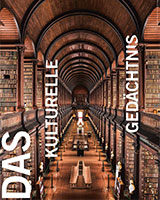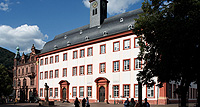The Cultural Memory. "Cold" and "Hot" Societies
Jan Assmann

Bild: © Thibaud Poirier / Trinity College Library
In the 1960s the ethnologist Claude Lévi-Strauss introduced the terms of “cold” and “hot” societies. By his definition, “cold” societies seek, via the institutions they give themselves, to quasi-automatically eliminate the impact that historical factors might have on their equilibrium and continuity. “Hot” societies, on the other hand, are characterised by a greedy need for change and have internalised their history in order to turn it into an engine of their development. For Lévi-Strauss, “cold” and “heat” are thus the typical poles of a civilisation process that inevitably leads from “cold” to “hot”.
Jan Assmann builds on this approach when he describes “cold” and “heat” as options of our cultural memory that exist at any time, regardless of writing, calendars, technology or forms of rule; he cites ancient Egypt and medieval Judaism as classical examples of “cold” societies. Moreover, there are “cold” and “hot” periods – periods in which people’s awareness of history is heightened in the interest of development and change. The modern period, beginning in the late 1700s and marked by great progress in many spheres of life, was a “hot” period for Western societies.
The Nazi era, which comprised a world war and the Holocaust, is a negative, but nevertheless normative chapter in Germany’s past that is at the core of the nation’s historical awareness. Based on this experience, German society has turned its historical coming-into-being into the driver of its development, self-image and identity – thus becoming a “hot” society. Similar forms of memory culture have developed in many societies that evolved into democracies following years of dictatorship – with the “cold” option, typical of dictatorships, of a forcible immobilisation of history. The “hot” option of learning from the past to ensure an evolution towards peace, humanity and the enforcement of human rights is slowly gaining ground, despite setbacks orchestrated by the political right.
Article (PDF)(Ger)
The Current Issue: HEISS & KALT

What are the impacts of climate change and how should science, politics and society deal with them? What is "Cold War 2.0" about in Ukraine? How can the history of glaciers be deciphered? What problems arise in connection with "hot chemistry"? And how can music express cold and heat? These and other exciting questions on the main topic HEISS & KALT are answered by 23 scientists from Heidelberg University in a total of 16 articles in the current issue of the research magazine "Ruperto Carola".
Complete Issue (PDF)

